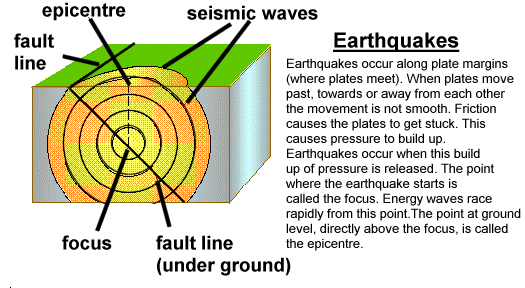 When I watch in news about recent earthquakes in Japan I get frightened. I am sure that most of us think that what will happen if there is earthquake in our city (say Delhi or Mumbai). Moreover fear of nuclear meltdown in Japan has put question marks on safety and security of nuclear plants across the world. Here are some questions about earthquakes which I tried to answer
When I watch in news about recent earthquakes in Japan I get frightened. I am sure that most of us think that what will happen if there is earthquake in our city (say Delhi or Mumbai). Moreover fear of nuclear meltdown in Japan has put question marks on safety and security of nuclear plants across the world. Here are some questions about earthquakes which I tried to answer Source : http://www.bennett.karoo.net/images/nathaz/earthquake.gif
visit
http://video.nationalgeographic.com/video/player/environment/environment-natural-disasters/earthquakes/earthquake-101.html
What is different between Magnitude and Intensity?
Earthquake magnitude is a measure of the size of the earthquake reflecting the energy released by the earthquake .It is represented by some real number on Richter scale say 5.8 .
Earthquake intensity indicates the extent of shaping experience at a given location due to a particular earthquake (For eg VIII on MSK scale)
It can be simply understood if we take an analogous .Consider a 60 Watt Bulb. It dissipates energy of 60 Watts. However, the brightness of light at different distances is different .In this case the former is magnitude and the latter is intensity
How dangerous is an earthquake of magnitude 8 compared to 6 or 7 on Richter scale.
Usually an earthquake greater than 5.0 can cause strong enough ground motion to be potentially damaging to structures .Earthquakes of magnitude greater than 8.0 are often termed as great earthquake.
Log10 E= 1.5M +11.8 is the empirical equation which relates the earthquake magnitude to the elastic energy released .By a increase in magnitude by 1 ,the energy released by the earthquake goes up by a factor of about 31 .Thus , a magnitude 8.0 earthquake releases about 31 times more energy as compared to an earthquake of 7 magnitude .
What are seismic zones?
The new earthquake zoning map of India divides India into 4 seismic zones (Zone 2, 3, 4 and 5) unlike its previous version which consisted of five or six zones for the country. According to the present zoning map, Zone 5 expects the highest level of seismicity whereas Zone 2 is associated with the lowest level of seismicity
How safe is Delhi & nearby areas from an Earthquake?
Delhi is located in seismic zone IV, the second highest earthquake hazard zone in India. Delhi has some heavily populated colonies on deep deposits of alluvium in various locations, particularly in the trans-Yamuna area. These areas are seismically vulnerable as large ground motion amplifications are expected due to their typical ground compositions. In the past, since 1720 AD, five earthquakes of Richer Magnitude of 5.5 to 6.7 are known to have occurred in the UT of Delhi or close to it. Two major lineaments, namely the Delhi-Haridwar ridge and Delhi-Moradabad faults, pass through the territory, both having a horrible potential of generating earthquakes of magnitude upto 7.0 on the Richter scale
Faridabad is more vulnerable to damage even by a moderate earthquake because they are on alluvial soil up to 200 m deep. These regions face a very grave problem of soil liquefaction during an earthquake. Moreover, earthquakes are amplified by the alluvial soils
Over 58.6 per cent of land in India is highly vulnerable to earthquakes and 38 cities fall under moderate to high risk seismic zones . Delhi, Chennai, Pune, Greater Mumbai, Kochi, Kolkata, Thiruvananthapuram, Patna, Ahmedabad, Dehradun are some of the cities falling in the vulnerability zone
To know please visit http://www.iitk.ac.in/nicee/EQTips/EQTip04.pdf
Do's & don'ts of an earthquake
I think that it is time for us to understand that India has high frequency of great earthquakes and low frequency of moderate earthquake .The only good thing about moderate earthquake is that they lead to improvements in construction at relatively low cost .Presently Indian earthquake problem is not receiving the due attention due to infrequent moderate earthquakes .

No comments:
Post a Comment